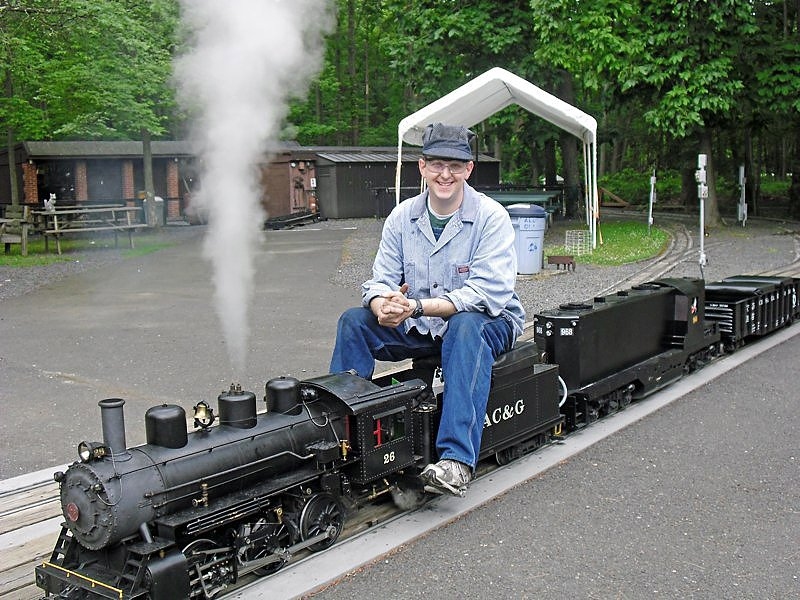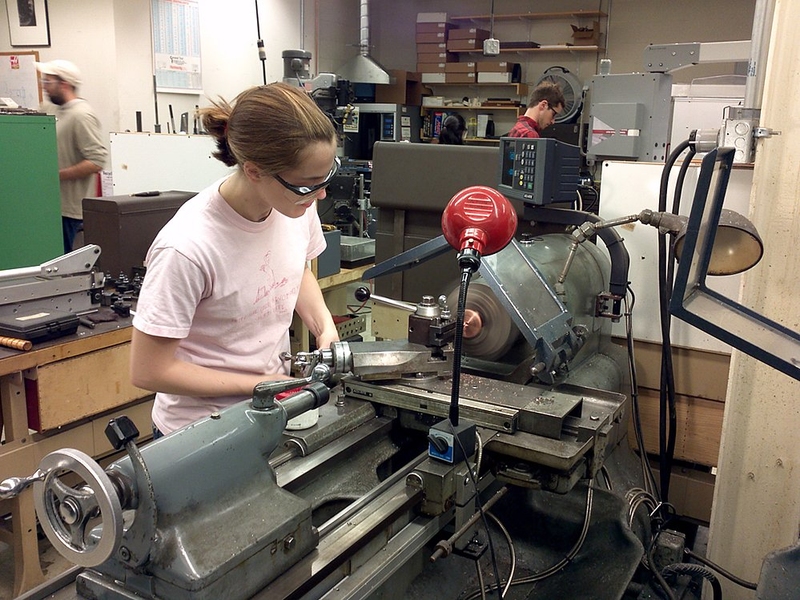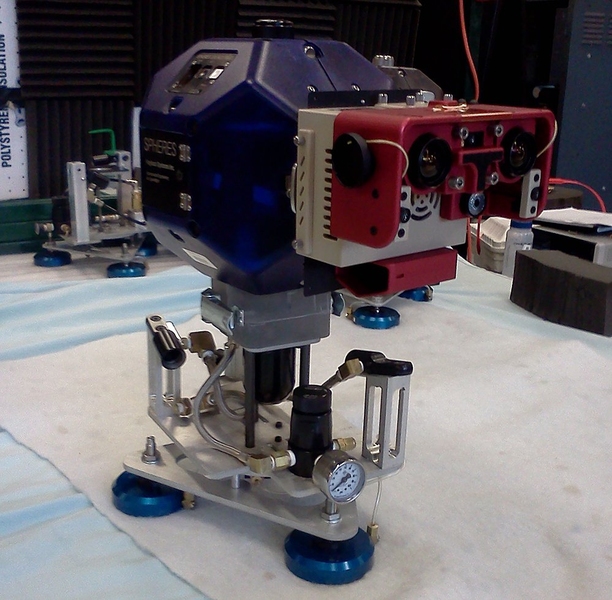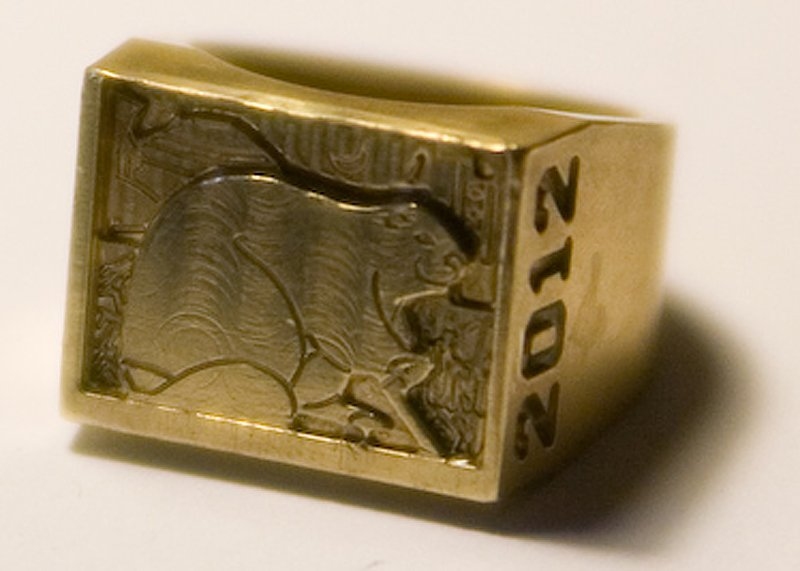Not every MIT graduate feels the need to buy his or her own CNC Bridgeport milling machine. But that is exactly what Adam Madlinger ’07, SM ’08 did. With a job at Exxon Mobil in research and engineering, he missed the tools and environment of the Edgerton Student Shop. So, he has replicated his own version of the shop in his garage in Martinsville, N.J., where there is not only a CNC mill but a CNC lathe, drill press, grinders, band saw, sheet metal-forming and welding equipment. This is where Madlinger builds his steam trains.
Madlinger’s passion for steam trains began in eighth grade when he fell in love with coal-powered 1/8 scale steamer trains (1.5 inches = 1 foot). When Madlinger came to MIT, he had already been taking machining classes at a vocational school, had set up a machine shop in his parent’s garage and built several steamer cars. Madlinger went full steam ahead at MIT, spending four to five days a week working (and instructing) in the Edgerton Student Shop. By graduation he had machined five cars for his steam train and had also built parts for his UROP in a chemical engineering lab focused on sustainable energy.
Where is the Edgerton Student Shop?
Couched between MIT Buildings 43 and 46 is a door leading to the Edgerton Student Shop. Founded by Edgerton Center director Professor J. Kim Vandiver in 1998, the shop is funded by MIT, with capital equipment acquisitions covered by an endowment gift from the Lemelson Foundation.
At a time when the knowledge of how to fabricate things is diminishing, the shop provides students with training on a wide range of fabrication tools. Vandiver notes that “today’s incoming students frequently have little opportunity to acquire hands-on fabrication skills before they come to MIT. To graduate creative and inventive designers and engineers we need to give our students the opportunities to acquire these skills.”
The shop offers intensive training classes — 12 hours per student. There is high demand for these classes, which are a prime opportunity for students to receive high-quality instruction in machining. With nothing but raw materials, they learn to machine the parts for a flashlight from scratch. They also learn how to use machine tools including a metal lathe, a milling machine, a band saw and more.
“Students who come here to take the training are very pleased with the end result. I think they feel like they leave here learning skills that they will use throughout their lifetime, not only in their workplace but also in their home life — whether it’s fixing a lawn mower or working on their vehicle or bicycle,” says Mark Belanger, manager of the Edgerton Student Shop. “They love it. This work is real, hands-on, and directly applicable to life."
Applying shop skills to life
“My profession is building scale versions of refineries but my hobby is building scale versions of trains,” Madlinger says. In his leisure time, Madlinger is the president of the New Jersey Live Steamers, a train enthusiasts club. At work, Madlinger builds working models of particular units in refineries such as a model of a chemical reactor to test out new catalysts.
“I find that the machining and mechanical skills that I developed while working and teaching at the Edgerton Student Shop provided indispensible preparation for the job I'm doing now at Exxon Mobil," Madlinger says. "I've always viewed those skills as what set me apart from my colleagues: namely, we all went to great schools and have solid knowledge of chemical engineering, but I supplement that knowledge with a complete background of practical machine shop and fabrication knowledge and experience, including CNC programming and machine operation, plus 3D printing, CAD/CAM... the list goes on. Not many people have that these days.”
Madlinger considers himself very much a “mens et manus” kind of guy. “It’s an incredible mental challenge, you can’t take every dimension and multiply it by 1/8th. A flame does not scale down. Coal burns the same way and there are certain fundamental physical dynamics that you have to accommodate and adapt your scaled design to. Every fiber of my being is trying to translate the two; translate the theoretical into something very practical.”
Cultivating the next generation of builders
Belanger cultivates an attitude of teamwork and mentorship in the Student Shop. As he puts it, “I sort of groom students when they come in, and — through both building a personal relationship with these students as well as seeing their capabilities in how they work in the shop — we groom them to be future instructors.” Students are given the chance not only to learn how to work with machines but also pay that knowledge forward, guiding the next class of inventors and engineers and assisting on projects.
While most of the projects made in the shop stay on the surface of planet Earth, others have taken a more ethereal spin. Graduate student Shawn Henderson built components for a state-of-the-art dark matter detector that is now deployed 2000 feet underground at the Waste Isolation Pilot Plant in Carlsbad, N.M.
“Before coming to MIT I had no machining experience. Although I made only a small fraction of the detector, I was active in every step of the design, and the practical experience I gained at the Student Shop was essential for the design process,” Henderson says.
Some projects are orbiting the Earth right now. Roedolph Opperman SM ‘10 worked on mechanical parts for the VERTIGO (Visual Estimation and Relative Tracking for Inspection of Generic Objects) flight hardware. This vision-based navigation upgrade to the SPHERES (Synchronized Position Hold Engage Reorient Experimental Satellites) will perform visual mapping and localization inside the International Space Station (ISS). The pieces went into assembly and were sent to the ISS in the fall of 2012.
“I see the shop as kind of like a middle school recess — a place where you can come and have fun, without the stresses of problem sets and homework,” Belanger says. “And you can just kind of release all of that through your hands. It’s just a fun place to be, and I try to make it a fun place for students."
Madlinger’s passion for steam trains began in eighth grade when he fell in love with coal-powered 1/8 scale steamer trains (1.5 inches = 1 foot). When Madlinger came to MIT, he had already been taking machining classes at a vocational school, had set up a machine shop in his parent’s garage and built several steamer cars. Madlinger went full steam ahead at MIT, spending four to five days a week working (and instructing) in the Edgerton Student Shop. By graduation he had machined five cars for his steam train and had also built parts for his UROP in a chemical engineering lab focused on sustainable energy.
Where is the Edgerton Student Shop?
Couched between MIT Buildings 43 and 46 is a door leading to the Edgerton Student Shop. Founded by Edgerton Center director Professor J. Kim Vandiver in 1998, the shop is funded by MIT, with capital equipment acquisitions covered by an endowment gift from the Lemelson Foundation.
At a time when the knowledge of how to fabricate things is diminishing, the shop provides students with training on a wide range of fabrication tools. Vandiver notes that “today’s incoming students frequently have little opportunity to acquire hands-on fabrication skills before they come to MIT. To graduate creative and inventive designers and engineers we need to give our students the opportunities to acquire these skills.”
The shop offers intensive training classes — 12 hours per student. There is high demand for these classes, which are a prime opportunity for students to receive high-quality instruction in machining. With nothing but raw materials, they learn to machine the parts for a flashlight from scratch. They also learn how to use machine tools including a metal lathe, a milling machine, a band saw and more.
“Students who come here to take the training are very pleased with the end result. I think they feel like they leave here learning skills that they will use throughout their lifetime, not only in their workplace but also in their home life — whether it’s fixing a lawn mower or working on their vehicle or bicycle,” says Mark Belanger, manager of the Edgerton Student Shop. “They love it. This work is real, hands-on, and directly applicable to life."
Applying shop skills to life
“My profession is building scale versions of refineries but my hobby is building scale versions of trains,” Madlinger says. In his leisure time, Madlinger is the president of the New Jersey Live Steamers, a train enthusiasts club. At work, Madlinger builds working models of particular units in refineries such as a model of a chemical reactor to test out new catalysts.
“I find that the machining and mechanical skills that I developed while working and teaching at the Edgerton Student Shop provided indispensible preparation for the job I'm doing now at Exxon Mobil," Madlinger says. "I've always viewed those skills as what set me apart from my colleagues: namely, we all went to great schools and have solid knowledge of chemical engineering, but I supplement that knowledge with a complete background of practical machine shop and fabrication knowledge and experience, including CNC programming and machine operation, plus 3D printing, CAD/CAM... the list goes on. Not many people have that these days.”
Madlinger considers himself very much a “mens et manus” kind of guy. “It’s an incredible mental challenge, you can’t take every dimension and multiply it by 1/8th. A flame does not scale down. Coal burns the same way and there are certain fundamental physical dynamics that you have to accommodate and adapt your scaled design to. Every fiber of my being is trying to translate the two; translate the theoretical into something very practical.”
Cultivating the next generation of builders
Belanger cultivates an attitude of teamwork and mentorship in the Student Shop. As he puts it, “I sort of groom students when they come in, and — through both building a personal relationship with these students as well as seeing their capabilities in how they work in the shop — we groom them to be future instructors.” Students are given the chance not only to learn how to work with machines but also pay that knowledge forward, guiding the next class of inventors and engineers and assisting on projects.
While most of the projects made in the shop stay on the surface of planet Earth, others have taken a more ethereal spin. Graduate student Shawn Henderson built components for a state-of-the-art dark matter detector that is now deployed 2000 feet underground at the Waste Isolation Pilot Plant in Carlsbad, N.M.
“Before coming to MIT I had no machining experience. Although I made only a small fraction of the detector, I was active in every step of the design, and the practical experience I gained at the Student Shop was essential for the design process,” Henderson says.
Some projects are orbiting the Earth right now. Roedolph Opperman SM ‘10 worked on mechanical parts for the VERTIGO (Visual Estimation and Relative Tracking for Inspection of Generic Objects) flight hardware. This vision-based navigation upgrade to the SPHERES (Synchronized Position Hold Engage Reorient Experimental Satellites) will perform visual mapping and localization inside the International Space Station (ISS). The pieces went into assembly and were sent to the ISS in the fall of 2012.
“I see the shop as kind of like a middle school recess — a place where you can come and have fun, without the stresses of problem sets and homework,” Belanger says. “And you can just kind of release all of that through your hands. It’s just a fun place to be, and I try to make it a fun place for students."
Hamsika Chandrasekar '13, a senior in MIT's Department of Brain and Cognitive Sciences, contributed additional reporting for this story.










